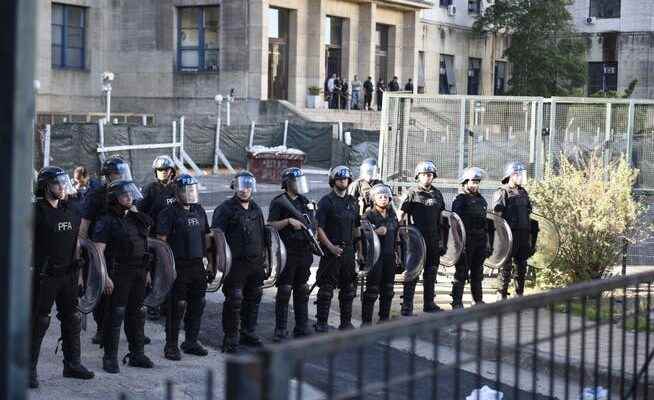The conviction comes late and the former Argentine president can still delay the imposed sanctions. Nevertheless, the case is of great importance for the country.
The court was cordoned off by security forces: while the verdict was being pronounced, the building had to be protected from protesting supporters of ex-President Kirchner.
Argentine Vice President Cristina Fernández de Kirchner was sentenced to six years in prison on Tuesday for corruption during her tenure as head of state from 2007 to 2015. In addition, she was banned for life from holding public office again.
According to the prosecutor, this is the biggest corruption case ever uncovered in Argentina. According to this, huge road construction contracts were awarded to Kirchner’s friend Lázaro Báez according to a kickback system without the statutory award process and at greatly inflated prices. The state is said to have suffered more than $1 billion in damage, while Kirchner and close allies pocketed large bribes. In addition to the vice president, Báez and eleven other defendants were found guilty.
The facts leave no room for doubt
Kirchner vehemently denies her guilt to this day and describes the whole thing as a political process. She argues that if anyone is to be condemned, then it is the members of parliament and senators instead of her, since Congress has approved the budgets in question. But the facts leave little doubt about the verdict. The question is rather why it took so long.
During the term of office of the then President Kirchner and also during the presidency of her husband Néstor Kirchner, who died in 2010, there were numerous signs of rampant corruption in the government. Under the long-standing Planning Minister Julio de Vido, a large part of the construction contracts in the Kirchners’ home province of Santa Cruz were awarded to Báez. In the early 1990s, he had become friends with the Kirchners as a simple bank clerk and was later used by the presidential couple as a straw man for their illegal operations.
When Néstor Kirchner became president in 2003, Báez founded a construction company that was solely responsible for carrying out government contracts and is said to have received contracts worth more than $5 billion in its first five years. Báez himself has been serving a 12-year prison sentence for money laundering since 2016. The latest verdict is the result of another very extensive process that lasted no less than three and a half years.
The Vice President is unapologetic
Kirchner gave an hour-long speech in response to the verdict. This once again expressed their dubious understanding of democracy and the rule of law. It is a legal mafia that is trying her, she explained, a parallel state that decides about the life, property and freedom of Argentines and does not have to stick to the election results. Separation of powers does not seem to exist for Kirchner. This verdict proves that this works in Argentina. It could be passed against her even though she is the vice president and the most powerful politician in the country.
However, the guilty verdict will not have immediate consequences. Kirchner can go to two other instances before she can be sanctioned. In addition, Congress must first deny her immunity. In addition, as she turns 70 next February, the prison sentence would be commuted to house arrest.
Nevertheless, this verdict represents a milestone. Corruption is one of the major obstacles to development in Argentina, which is inherently wealthy and can feed ten times as many people as it has inhabitants. The late but thorough legal processing and documentation of this immense case of corruption gives hope for a better future for the country.
